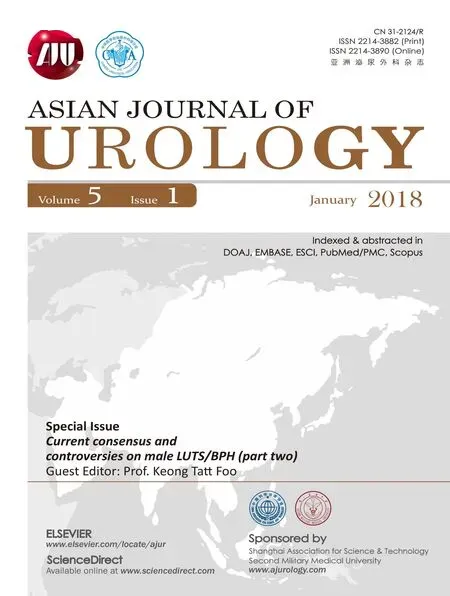Obituary for Donald S.Coffey:Remembering a pioneer in the field of prostate cancer research.(1932-2017)
2018-01-02
It is with the deepest sadness that we publish the following obituary for Donald S.Coffey,an Asian Journal of Urology(AJU)respected author.Dr.Coffey was invited to write a paper for the inaugural issue of AJU in 2014.Despite he was 82 years old,he accepted our invitation and contributed a thoughtful perspective article.He worked diligently,and his paper improved the impact of AJU.The obituary published here was first published by Society of Basic Urologic Research(SBUR).A memorial service honoring Dr.Donald S.Coffey was held on November 18th,2017 at the church of the Holy Comforter in Luther ville,Maryland,USA.
Donald S.Coffey,Ph.D.was born in Bristol,a twin city on the border of Virginia and Tennessee,on October 10,1932.As a young man,he grew up working at his father’s automobile service station.He then attended King College in Bristol,Tennessee.In 1953,after leaving King College,he entered the University of East Tennessee.In 1955,he was hired by the North American Rayon Company where he served as a chemist and engineer.During these early years,he would use meditation to re flect upon life,creativity,and the universe.During one of these sessions,his mind inexplicably turned to cancer.He decided,rather unexpectedly,that he would change his life and career to study cancer.Speaking about this with a colleague and mentor at North American Rayon,Dr.Lee R.Herdon,he learned of Johns Hopkins as a top institute to pursue this “hunch”.Dr.Coffey and his family packed their bags and moved to Baltimore.
Dr.Coffey worked his way into Hopkins as a volunteer,washing glassware at night and spending free time with scientists,while working days as an engineer at the Westinghouse Electronic Corporation in Baltimore.Dr.Coffey attended evening classes at McCoy College,the Hopkins night school,and soon obtained a position as a technician at the Brady Research Laboratory where he worked nights with Charles Tesar,while keeping his primary job at Westinghouse.With the sponsorship of Dr.William Scott,director of the Brady Urologic Institute,he became acting director of the Brady Urological Research Laboratory from 1959 to 1960,left his position at Westinghouse,and entered the graduate program in the medical school’s department of physiological chemistry and received his Ph.D.in 1964.
During the late 1960s,Dr.Coffey became involved in research with the Brady Institute during Dr.Guy Williams-Ashman’s tenure as director of the Brady Laboratory for Reproductive Biology.Upon Dr.Williams-Ashman’s return to Chicago in 1969,Dr.Coffey became director of the laboratory.Dr.Coffey’s versatility attracted notice in other Hopkins departments.He chaired the Department of Pharmacology without ever taking a course in pharmacology.With no medical degree,he helped found the Cancer Center in 1973 with its first director,Albert Owens,and then ran it brie fly in 1987.Dr.Coffey became one of Johns Hopkins’ first triple professors,and went on to serve as faculty in the departments of Urology,Oncology,Pharmacology and Molecular Sciences,and Pathology.From 1974 to 2004,Dr.Coffey served as Director of Research for the Brady Urologic Institute.Among Dr.Coffey’s many scientific accomplishments was his pioneering work in de fining the nuclear matrix and studying nuclear structure and chromatin organization.In the urologic community,he is renowned forhismentorship and trainingofmany outstanding leaders in the field of urology and cancer research.This family extends beyond direct trainees.Dr.Coffey interacted and mentored any ambitious student,clinician and/or scientist who knocked on his door or stopped him in the hallways of Johns Hopkins or a national meeting.Recently,the James Buchanan Brady Urologic Institute produced a full length film about Dr.Coffey and his legacy,which can be viewed at their website(http://urology.jhu.edu/videos/history.php).
During his career Dr.Coffey was a member of the president’s committee on governance at the Hopkins School of Medicine,a member and firstfaculty-elected vice-chairman of the medical school council,the advisory board,the committee on educational policy and curriculum,the professional promotions committee,the medical scientist training program and the committee on cultural and social affairs.From the U.S.Public Health Service,Dr.Coffey received the Research Career Development Award from 1966 to 1972 and was in the experimental therapeutics study section from 1971 to 1975.He was a member of the National Prostatic Cancer Task Force,Working Cadre,and the President’s Cancer Advisory Board.Dr.Coffey has served on the editorial boards of the Journal of Urology,Advances in Sex Hormone Research,International Union Against Cancer,Prostate and the World Journal of Urology.In addition,Dr.Coffey was the 1992 recipient of the American Urological Association’s Eugene Fuller Triennial Prostate Award and the 2001 AUA Certificate of Achievement Award,which recognized his lifetime of career achievements in urology.In 2015 he received the AACR Margaret Foti Award for Leadership and Extraordinary Achievements in Cancer Research.Many of Dr.Coffey’s prote´ ge´ s are leaders in prostate cancer research today.
Dr.Donald S.Coffey will be missed by his colleagues,friends,and family around the world.
杂志排行
Asian Journal of Urology的其它文章
- Bipolar transurethral enucleation and resection of the prostate:Whether it is ready to supersede TURP?
- Laparoscopic adenomectomy in BPH-Does it have a role today?
- Innovative endoscopic enucleations of the prostate-Xie’s Prostate Enucleations
- Non-invasive evaluation of lower urinary tract symptoms(LUTS)in men
- Botulinum toxin and benign prostatic hyperplasia
- The use of 5-alpha reductase inhibitors in the treatment of benign prostatic hyperplasia
